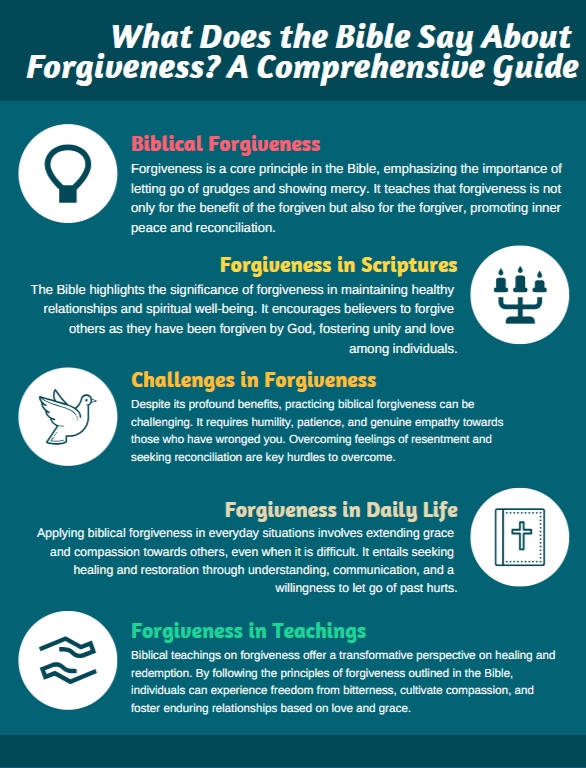Forgiveness is a central theme in the Bible, woven throughout its pages from Genesis to Revelation. This powerful concept can transform lives, heal relationships, and bring peace to troubled hearts.
In this comprehensive exploration, we’ll delve deep into the Biblical teachings on forgiveness, examining its importance, challenges, and practical applications in our daily lives.
1. The Foundations of Forgiveness in Scripture
Old Testament Perspectives
The concept of forgiveness is not exclusive to the New Testament. Its roots can be traced back to the very beginning of the Bible. In the Old Testament, we see God’s forgiveness as a key attribute of His character.
- Exodus 34:6-7 – “The Lord, the Lord, a God merciful and gracious, slow to anger, and abounding in steadfast love and faithfulness, keeping steadfast love for thousands, forgiving iniquity and transgression and sin…”
- Psalm 103:12 – “As far as the east is from the west, so far does he remove our transgressions from us.”
- Isaiah 43:25 – “I, I am he who blots out your transgressions for my own sake, and I will not remember your sins.”
These passages highlight God’s willingness to forgive and His desire for His people to emulate this characteristic.
New Testament Teachings
In the New Testament, forgiveness takes center stage as a cornerstone of Jesus’ teachings and the Christian faith.
- Matthew 6:14-15 – “For if you forgive others their trespasses, your heavenly Father will also forgive you, but if you do not forgive others their trespasses, neither will your Father forgive your trespasses.”
- Ephesians 4:32 – “Be kind to one another, tenderhearted, forgiving one another, as God in Christ forgave you.”
- Colossians 3:13 – “Bear with each other and forgive one another if any of you has a grievance against someone. Forgive as the Lord forgave you.”
These verses emphasize the reciprocal nature of forgiveness and its connection to our relationship with God.
2. The Importance of Forgiveness
Spiritual Benefits
- Restores our relationship with God: Forgiveness allows us to maintain a close connection with our Creator.
- Reflects God’s character: By forgiving others, we demonstrate God’s love and mercy to the world.
- Facilitates spiritual growth: The act of forgiving challenges us to grow in empathy, compassion, and humility.
Psychological and Emotional Benefits
- Reduces stress and anxiety: Letting go of grudges can lead to improved mental health.
- Promotes healing: Forgiveness can help heal emotional wounds and trauma.
- Increases empathy: The process of forgiveness often leads to a greater understanding of others.
Social Benefits
- Strengthens relationships: Forgiveness can mend broken bonds and deepen existing connections.
- Creates a culture of grace: Practicing forgiveness encourages others to do the same.
- Promotes peace: On a larger scale, forgiveness can contribute to conflict resolution and social harmony.
3. Challenges to Forgiveness
While the Bible advocates for forgiveness, it’s important to acknowledge that forgiving others can be a difficult process. Some common challenges include:
- Severity of the offense: The more serious the transgression, the harder it may be to forgive.
- Lack of remorse: It can be challenging to forgive someone who doesn’t appear sorry for their actions.
- Fear of vulnerability: Forgiveness may feel like letting your guard down.
- Misunderstanding of forgiveness: Some may equate forgiveness with condoning the offense or forgetting it happened.
4. Biblical Examples of Forgiveness
The Bible provides numerous examples of forgiveness in action. Let’s examine a few key stories:
Joseph Forgiving His Brothers
- Context: Joseph’s brothers sold him into slavery out of jealousy.
- Resolution: Years later, Joseph forgave them and provided for their families during a famine.
- Key Verse: Genesis 50:20 – “As for you, you meant evil against me, but God meant it for good…”
David Forgiving Saul
- Context: King Saul repeatedly tried to kill David out of fear and jealousy.
- Resolution: David had opportunities to kill Saul but chose to spare his life and honor him as God’s anointed.
- Key Verse: 1 Samuel 24:10 – “This day you have seen with your own eyes how the Lord delivered you into my hands in the cave. Some urged me to kill you, but I spared you…”
Jesus Forgiving Those Who Crucified Him
- Context: Jesus was unjustly condemned and crucified.
- Resolution: Even while on the cross, Jesus asked God to forgive his executioners.
- Key Verse: Luke 23:34 – “Father, forgive them, for they know not what they do.”
5. The Process of Biblical Forgiveness
The Bible outlines a process for forgiveness that involves several steps:
- Acknowledge the hurt: Recognize the pain caused by the offense (Psalm 32:5)
- Choose to forgive: Make a conscious decision to let go of resentment (Colossians 3:13)
- Extend grace: Offer forgiveness, even if the offender hasn’t asked for it (Luke 23:34)
- Seek reconciliation when possible: Work towards restoring the relationship (Matthew 5:23-24)
- Trust God for justice: Leave vengeance to God (Romans 12:19)
6. Practical Applications of Biblical Forgiveness
Applying Biblical principles of forgiveness to our daily lives can be challenging but rewarding. Here are some practical steps:
- Practice empathy: Try to understand the perspective of the person who hurt you.
- Pray for those who have wronged you: This can soften your heart towards them (Matthew 5:44).
- Set healthy boundaries: Forgiveness doesn’t mean allowing harmful behavior to continue.
- Seek support: Turn to trusted friends, family, or a counselor for guidance in the forgiveness process.
- Remember God’s forgiveness: Reflect on how much God has forgiven you to motivate your forgiveness of others.
7. Common Misconceptions About Biblical Forgiveness
To fully understand Biblical forgiveness, it’s important to address some common misconceptions:
| Misconception | Biblical Truth |
|---|---|
| Forgiveness means forgetting | The Bible encourages remembering God’s forgiveness (Deuteronomy 5:15) but choosing not to hold offenses against others |
| Forgiveness requires reconciliation | While reconciliation is ideal, it’s not always possible or safe. Forgiveness can be one-sided |
| Forgiveness means the offense wasn’t serious | Forgiveness acknowledges the seriousness of the offense but chooses to release the offender from the debt |
| You can’t forgive until you feel like it | Forgiveness is a choice, not a feeling. Feelings often follow the decision to forgive |
| Forgiveness is a one-time event | Forgiveness is often a process that requires ongoing commitment |
8. The Role of Repentance in Forgiveness
While the Bible calls us to forgive even when the offender hasn’t repented, it also emphasizes the importance of repentance:
- Luke 17:3-4 – “If your brother sins, rebuke him, and if he repents, forgive him, and if he sins against you seven times in the day, and turns to you seven times, saying, ‘I repent,’ you must forgive him.”
- Acts 3:19 – “Repent therefore, and turn back, that your sins may be blotted out.”
Repentance involves acknowledging wrongdoing, expressing genuine remorse, and committing to change. While we’re called to forgive regardless of the offender’s response, repentance can facilitate reconciliation and the restoration of trust.
9. Forgiveness and Justice
A common struggle in understanding Biblical forgiveness is reconciling it with the concept of justice. The Bible addresses this tension:
- Romans 12:19 – “Beloved, never avenge yourselves, but leave it to the wrath of God, for it is written, ‘Vengeance is mine, I will repay, says the Lord.'”
- Psalm 37:27-29 – “Turn away from evil and do good; so shall you dwell forever. For the Lord loves justice; he will not forsake his saints. They are preserved forever, but the children of the wicked shall be cut off. The righteous shall inherit the land and dwell upon it forever.”
These passages suggest that while we are called to forgive, we can trust God to ultimately bring about justice.
Conclusion, The Transformative Power of Forgiveness
The Bible’s teachings on forgiveness offer a profound path to personal and relational healing. By embracing forgiveness, we not only obey God’s commands but also experience the freedom and peace that come from releasing resentment and bitterness.
As we’ve explored, forgiveness is not always easy, but it is always worthwhile. It reflects the very heart of the Gospel – that while we were still sinners, Christ died for us (Romans 5:8). As recipients of God’s incredible forgiveness, we are empowered and called to extend that same grace to others.
In a world often characterized by conflict and division, the Biblical message of forgiveness offers hope for restoration and reconciliation. By practicing forgiveness in our daily lives, we can experience personal transformation and contribute to a more compassionate and understanding society.
Remember, forgiveness is not just a one-time action but an ongoing process and a way of life. As we continue to grow in our understanding and practice of Biblical forgiveness, may we experience the truth of Proverbs 17:9: “Whoever covers an offense seeks love, but he who repeats a matter separates close friends.”






